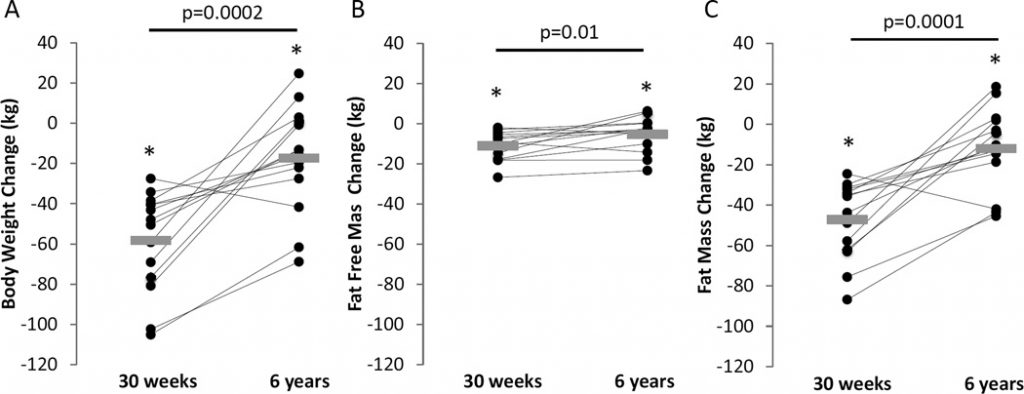Lessons from the Biggest Loser


Dr. Phillip Chang
Board Certified By The American Board of Plastic Surgeons.
Voted Top Plastic Surgeon in Loudoun, Virginia
Offices in Leesburg, Virginia.



The diet and exercise regimens were not based on any professionally accepted nutritional and health programs. And in fact, the lessons learned from the Biggest Loser TV show are that extreme diet and exercise can be physically and mentally harmful.
What was the Biggest Loser?
The Biggest Loser was an extremely popular reality TV show that ran on NBC for 17 seasons between 2004 and 2016. The show featured obese and overweight contestants who competed against each other to see who could achieve the highest percentage of weight relative to their original weight. The contestants were encouraged and counseled by nutritionists and physical trainers who helped them along their weight loss journeys.
The tremendous popularity of the show was based in part by the spectacle of obese contestants sharing their weight loss journeys with an overweight American population who could not help but to partially relate to the contestants. There is the subconscious or conscious encouragement that if these extremely overweight people could lose hundreds of pounds, maybe we can lose at least ten.
The problem was that The Biggest Loser was a contrived reality TV show created to provide entertainment and ratings. The diet and exercise regimens were not based on any professionally accepted nutritional and health programs. And in fact, the lessons learned from the Biggest Loser TV show are that extreme diet and exercise can be physically and mentally harmful.
What happened to the first contestant to win the Biggest Loser?
Ryan Benson was the first winner of the The Biggest Loser in 2005. Benson, who was 300 pounds, lost 122 pounds and won $250,000. The reality TV star has since regained all of his weight back. After spending five grueling months exercising and dieting as a “Biggest Loser” contestant, the first thing Benson did to celebrate his accomplishment was order a burger and fries.
In an interview with the Business Insider, he states, “In my mind I just thought I’ve been training so hard I want to eat something I craved for a few months — a burger, fries, some ribs; That was one of the things that propelled me to the finish line. I thought, when I’m done I’m going to get this. It was a reward.”
What is wrong with extreme caloric restrictions?

NIH Study about The Biggest Loser: What is Persistent Metabolic Adaptation?
The graph below shows the following findings
- 13 out of 14 contestants regained all of their weight back
- Percent body fat increased from 28% just after the show to 45% after 6 years
- Metabolic rate decreased during the show; and decreased even more after 6 years ( 2,607 calories per day at rest before the competition, dropped to about 2,000 calories per day after the show; and 1,900 per day after 6 years )
When the show began, the contestants, though hugely overweight, had normal metabolisms for their size; this means they were burning a normal number of calories for people of their weight. The problem is that by the end of the show, their metabolisms had slowed radically and their bodies were not burning enough calories to maintain their thinner sizes.
The fact that the contestant’s metabolic rate would decrease with caloric restriction was not new. What shocked the researchers was that the metabolic rate AFTER the show slowed down even further. Slowing of your metabolism means that you would have to restrict caloric intake even further just to maintain your weight; and if you don’t, you will actually gain more weight over time.
Danny Cahill, one of the contestants who won Season 8 of the Biggest Loser was one of the worst off; he regained more than 100 pounds after the show. His metabolism slowed so much that, just to maintain his current weight of 295 pounds, he now has to eat 800 calories a day less than a typical man his size. He states that anything more than that turns to fat.
Caloric Restriction also increases your Hormonal Drive for Hunger
Slower metabolisms are probably the major reason why the contestants regained their weight; but it is not likely the only reason. The researchers also found a dramatic decrease in a hunger hormone called Leptin. High Leptin levels make you feel satiated while low Leptin levels make you feel hungry. The contestants started out with normal levels of leptin. By the season’s finale, they had almost no leptin at all, which would have made them ravenous all the time. As their weight returned, their leptin levels drifted up again, but only to about half of what they had been when the season began, the researchers found, thus helping to explain their urges to eat.
Leptin is just one of a cluster of hormones that control hunger. In a one-year study funded by Australia’s National Health and Medical Research Council, Dr. Joseph Proietto of the University of Melbourne and his colleagues recruited 50 overweight people who agreed to consume just 550 calories a day for eight or nine weeks. They lost an average of nearly 30 pounds, but over the next year, the pounds started coming back. The study also reviewed 4 other hunger hormones. Levels of hormones that make you satiated went down while hormones that make you hungry went up.
So what are the lessons from the Biggest Loser?
- Metabolic rate decreases with severe caloric restriction
- A decrease in metabolic rate makes it even harder to lose weight as you have to eat even less calories to maintain existing weight… which decreases your metabolism even further
Hunger hormones such as Leptin ( high levels cause you to feel full ) decrease dramatically with caloric restriction.
FAQs
Acne is the most common skin condition in the U.S. affecting nearly 50 million Americans at any time. Acne is caused when hair follicles become clogged with oil and dead skin cells. It can often be persistent and unsightly.
The Acne Clear BBL is a cutting-edge acne treatment that uses the power of light to comfortably and effectively clear acne without expensive creams or toxic medicines…
Brown sun and age spots are some of the first signs of aging and sun damage.
Treatment options include
- Creams such as hydroquinone and retin A. Hydroquinone is a bleaching agent while Retin A increases cellular turnover. Over-the-counter creams will generally not have high enough concentrations to be effective.
- Forever Young BBL – Cutting edge technology providing the most powerful and effective IPL option.
The Forever Young BBL uses Broad Band Light to alter skin melanin and rejuvenate cellular DNA. Instead of spending time and money on ineffective skin care products many of our patients have turned to the Forever Young BBL to make their skin more vibrant and youthful; reducing brown and red pigmentation problems, promoting collagen, and rejuvenating cellular DNA. It is the most popular laser treatment in our clinic.
What to expect from the Forever Young BBL:
- Treatments take 20-30 minutes
- Up to 80% improvement after a single treatment.
- Most patients will benefit from adding a Micro Laser Peel and a Profractional Laser Peel ( Triple Laser Package )
Fine facial lines and wrinkles are a result of UV sun damage, the breakdown of collagen, and a decrease in skin hydration. The Micro Laser Peel and the Profractional Laser are ablative lasers designed to reverse these changes.
- The Micro Laser Peel precisely ablates the surface skin in order to remove UV damaged skin
- The Profractional Laser ablates deep columns of skin that can reach to the deep dermis. This allows for skin contraction but it also encourages new cell grown and organizes new collagen
Results depend on the depth of treatment. Recovery from a maintenance treatment can be as little as a day; but recovery from aggressive treatments can be as much as 7 days. Many patients will benefit from the addition of the Forever Young BBL ( Triple Laser Package ).
More Articles For You

Can Breast Implants Cause Weight Gain?
Let’s explore the impact of breast implants on body weight, providing expert insights on the relationship between augmentation and weight changes. Discover the importance of lifestyle, diet, and exercise in managing body weight post-surgery and how to navigate the recovery phase effectively.

What are Your Options for Dealing With Loose Skin After Weight Loss?
Weight loss is a process that can bring significant health benefits, including reducing the risk of conditions such as heart disease, diabetes, and certain types of cancer. However, rapid or substantial weight loss may also lead to an undesired aesthetic result: loose skin. Let’s discuss some possible causes and, more importantly, treatment options for addressing loose skin.
What Makes You Fat and Hungry All The Time
In recent years we have heard over and over that it’s all about calories in and calories out if you want to lose weight. However, since the ’70s, it seems that the obesity epidemic here in the United States has been on the rise. We’re going to take a look at the biology behind how our bodies use food for energy to see how to properly feed your body and not store the excess as fat.

Can Bioidentical Hormones Help With Weight Loss?
Hormones play key roles in most of our body’s regular functions. As we age, our hormone levels can begin to drop or become unbalanced, bringing with it a bevy of unpleasant side effects, including weight gain. Learn more about how bioidentical hormones can help with weight loss.
Contact Us
703-214-4823
available from 10:00 – 19:00
Address AESTHETICA COSMETIC SURGERY
19500 Sandridge Way
Suite 350
Leesburg, VA 20176
Email [email protected]

